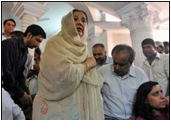http://news.bbc.co.uk/2/hi/south_asia/8608878.stm
Thursday, 8 April 2010
A marriage is a time for celebration and joy, and cricketer Shoaib Malik will no doubt be eager to put the embarrassing episode of his first marriage far behind him before getting hitched to Indian tennis star Sania Mizra next week.
There will be a huge difference between the two marriages - he'll be present in person for this one, not merely on the end of a telephone line. Malik is reported to have conducted an internet and telephone relationship with Ayesha Siddiqui from Hyderabad, finally tying a long-distance knot with her in 2002. According to a story on the front page of the Indian daily newspaper The Hindu, telephone marriage has taken off among Indian Muslims, and in many Muslim countries. But many people, it continues, have been left "wondering whether telephonic marriage is legitimate at all." 'Everything is possible'
"Telephone nikah (matrimonial contract) is no longer valid, simply because all four parties cannot be at the same place to sign the nikahnama (wedding registration certificate) if the nikah is taking place over the telephone, with the bride and groom in different cities or countries," Mohammed Khader Ali, Sadar Qazi, chief Qazi of Hyderabad, was quoted as saying. "There are so many cases of marriages being conducted in so many different ways - everything is possible within reason," he told the BBC News website. Both the Malik and Siddiqui families are said to follow the Hanafi school of Islamic tradition. Mr Sawma explained that in his view, a marriage contract agreed upon by a telephone conversation is valid as long as it satisfies the main Hanafi requirements, including:
The mahr, he explains, is an amount of money, or any object that has value, that will be given by the groom to the future bride. "Mahr is an obligation on the husband and is a necessary component of any Islamic marriage contract," said Mr Sawma. In the Hanafi tradition, the mahr is divided into a "muqaddam" (upfront), to be paid at the time of signing of the contract and a muakhar (deferred) to be paid at the time of divorce or death, he explained.
Quickie divorce He said that the proposal must be clearly expressed and it must be met with a clear acceptance.
"Should these three elements occur, the marriage will be considered legal and binding. The contract does not have to be written. It can be verbal and will have the full force of the law under Islamic Sharia," said Mr Sawma. He drew parallels with the practice of couples entering into a marriage via correspondence, centuries ago. "As long as the letters contained all the requirements and were signed in front of witnesses, this would constitute a marriage contract," he said. Given the level of interest in the marriage, Shoaib will be no doubt thankful that the divorce was relatively straightforward. In a number of countries - including India - a Muslim man can divorce his wife in a matter of minutes. This has included divorce by mail, over the phone and even via mobile phone text messages. His wife will be immediately divorced if there are at least two male witnesses. The husband is then obligated to give "nafaqa" (alimony) to his wife for three months. Shoaib has apparently agreed to pay 15,000 rupees (about $337; £220) to Ayesha for three months. According to many reports, Shoaib's divorce means that he is now free to marry Sania next week. But technically, they could have got married anyway, as Islam allows a man to take four wives as long as he is able to meet all their needs.
http://edition.cnn.com/2009/WORLD/meast/11/11/egypt.divorce/index.html 'LET'S TALK ABOUT SEX, DIVORCE' IN EGYPT By Olivia Sterns for CNN
Egyptian couples arrive at a Cairo stadium for a collective wedding organised by Karme el-Islam association in 2007.
London, England (CNN) -- A growing number of Egyptian women are demanding a divorce and seeking counsel for their marriages, as the social stigma against it weakens and talking about relationship problems becomes more popular in the media. Once considered taboo to discuss in public, private relationships between men and women are now the hot topic of television talk shows, radio programs and blogs. Mahasen Saber, host of Divorce Radio, says that her program is helping to break the stigma. "People are shocked at first, but after they read and listen to what we write and present, they like what we talk about...they are happy because I am talking about something they are dealing with" Saber told CNN. Earlier this year she launched the radio show to complement her blog called "I Want A Divorce." In most cases couples simply don't know how to deal sexually with their partner "Women are taking advantage of new media outlets to voice their concern," said Nadya Khalife, a Human Rights Watch researcher focused on women's issues in the Middle East. "They are talking more openly about these issues. They are becoming less shameful in Egyptian society." Those issues include sex. Dr. Heba Kotb is a leading sexologist in Cairo who appears regularly on TV. She has two PHD's, one in sexuality from the University of Florida, and she considers herself a conservative Muslim. Dr. Kotb attributes 80 percent of divorce in Egypt to sexual problems. "In most cases couples simply don't know how to deal sexually with their partner," she told CNN. "I provide the information -- this is right, this is wrong, you should do this." "Often it is just miscommunication. The psychology of men is not understood by women and vice versa." When Dr. Kotb started her practice eight years ago, she saw only a handful of patients per week. Today she is booked months in advance. "People now think it does not have to be the end of the marriage when they have problems. [They think] it's worth it to give counseling a try." For Egyptian women, getting divorced has traditionally carried with it a severe stigma. "The main perception of a woman who is divorced in Egypt, or in any Arab country, is that she is evil or something is not right ... that she has done something wrong" said Saber. "I started Divorce Radio to change that view." "The stigma has nothing to do with religion. It's culture," said Madiha el Safty, professor of sociology at the American University in Cairo. "Egypt is a patriarchic society, very male-dominated. Men always blame women for all their problems, but the stigma [against divorced women] has eased" Dr. Kotb also blamed the high rate of divorce on the fact that "a relationship equals marriage" in Egypt. "In the West, it's a matter of breaking up. Here there is no living together." Saber agreed: "In Egypt, there is no space to have a relationship without marriage. It's the dream of every girl in Egypt to get married," she said. In Egypt marriage falls under family law, which is based on Shari'a, Islamic religious law, and which gives men and women unequal rights to a divorce. "In Islamic Shari'a, a man can divorce his wife at any time, in any place, and for any or no reason by simply uttering the following words: "I divorce you, I divorce you, I divorce you," explained Gabriel Sawma, an attorney specializing in Muslim divorce law and professor at Farleigh Dickinson University. Women, on the other hand, can get a divorce only through court action, in a much more formal legal process. In 2000, Egypt liberalized their laws, granting women the right to initiate a "no-fault" divorce (khula). Though this is considered a step forward, women are still required through khula to relinquish any claim to alimony or their dowry. "There was an effort to modernize divorce," said Prof. Sawma. "Before, the man was not obligated to agree to a divorce."
http://view2.fdu.edu/fdu-in-motion/politics-on-the-publicmind/sharia-islamic-law-in-theory-and-practice/
SHARI'A ISLAMIC LAW IN THEORY AND PRACTICEApr. 5, 2010, Gabriel Sawma, "Islamic Shari'a in Theory and Practice" (discussion of new and enduring issues in Islamic Shari'a law). Mr. Sawma is the author of The Qur'an: Misinterpreted, Mistranslated, and Misread. The Aramaic Language of the Qur'an (Adi Books, 2006) and is also a lawyer, professor, and consultant on international law, mainly European Union Law, Middle East Law and Islamic Shari'a law. He has been admitted to the Lebanese Bar Association of Beirut, and is an Associate Member of The New York State Bar and the American Bar Associations. More info on Sawma.
https://www.youtube.com/watch?v=fdwReohaIcs
POWER STRUGGLE ENSUES IN WAKE OF EGYPT ELECTIONS Publicado el 19 jun. 2012 June 19, 2012 - Egyptian demonstrators are expected to gather in Cairo's Tahrir Square Tuesday to protest military control in the wake of presidential elections there.
http://yoinfluyo.com/mundo/100-panorama-global/17396-gobierno-de-trump-puede-marcar-una-ruptura-respecto-de-obama GOBIERNO DE TRUMP PUEDE MARCAR UNA RUPTURA RESPECTO DE OBAMA
|
|||||


